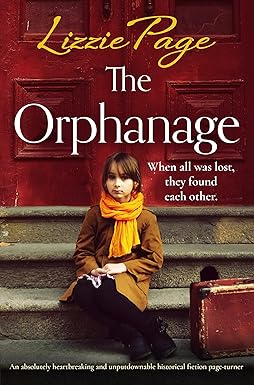Genres: Fiction, Historical
Buy on Amazon

Lizzie Page's The Orphanage is a heartwarming and poignant tale set against the backdrop of post-war Britain. The story centers on Clara Newton, who steps into the role of Housemother at Shilling Grange Orphanage, a haven for children displaced by the ravages of war. This new chapter in Clara’s life comes after the tragic loss of her fiancé, a brave American pilot, leaving her not only grieving but also searching for purpose.
The novel paints a vivid picture of Clara's struggles and growth as she attempts to bring stability and care to the war-torn children of Shilling Grange. With funds scarce and the children’s emotional scars deep, Clara faces a daunting challenge. Her initial clumsiness and sense of inadequacy are portrayed with compassion and authenticity, making her a relatable and empathetic character.
The plot thickens with the introduction of Rita, a young girl whose distressing stories about the previous nuns reveal a dark past that haunts both the children and the orphanage. Clara's accidental destruction of Rita's precious memento exacerbates her feelings of incompetence and her fear that the children might be better off without her. This internal conflict drives much of the emotional weight of the narrative.
However, Clara’s journey is not a solitary one. The enigmatic Ivor, an ex-resident of Shilling Grange and local war hero, becomes an unexpected ally. His initial distrust and Clara's fierce independence create tension, but their eventual partnership and mutual respect bring a sense of hope and collaboration. Ivor’s role as a handyman and his way with the children provide a steadying influence and much-needed support for Clara.
The development of Clara's relationship with the children and with Ivor is portrayed with a tender touch. As Clara slowly adapts and begins to heal from her grief, the story explores themes of redemption, resilience, and the healing power of love and community. The orphanage itself transforms from a place of desolation into one of hope and belonging, mirroring Clara’s own emotional journey.
Page's writing is both evocative and engaging, capturing the reader's attention with rich descriptions and a compelling narrative. The characters are well-drawn, and their growth throughout the story feels both authentic and satisfying. The novel's exploration of themes such as grief, recovery, and the search for family resonates deeply, making The Orphanage a touching and memorable read.
In conclusion, The Orphanage is a beautifully crafted story about finding one's place and purpose amidst adversity. Clara’s journey from a grieving outsider to a loving caretaker, supported by the steadfast Ivor and the resilient children, makes for an inspiring and uplifting tale. Lizzie Page’s ability to weave a story of heartache and hope, with a strong sense of place and character, ensures that The Orphanage will stay with readers long after they turn the final page.

